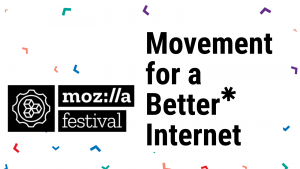Generative AI: Opportunities, Concerns & Solutions from MozFest 2023
Better Internet
CC has been exploring what artificial intelligence means for our strategy to support better sharing and the public interest commons that we help steward. In March, we joined with our partners in the Movement for a Better Internet to discuss generative AI with the MozFest 2023 community: What opportunities does AI offer? What are its risks? And where might we work to address them?
Known as a “premiere gathering for activists in diverse global movements fighting for a more humane digital world,” MozFest provided a great opportunity to bring together over 50 people to generate insights into what we should be thinking about generative AI as we work to help shape policy to build a better internet.
Overall, our session participants saw substantial opportunities in generative AI, including how it could enhance human creativity and efficiency, democratize creative expression, and offer new insights to difficult problems. But they also had several concerns: AI is moving too fast and it’s not clear what impacts it will have. Generative AI could have negative economic impacts, may be developed or implemented in harmful or biased ways, and raises concerns about intellectual property.
Imagining how their concerns could be addressed, our participants looked at both big picture solutions — systemic changes in society and economy — and more specific solutions — public investment in AI for all, policy and regulation, practices to help ensure ethical development, and education about generative AI.
Last, but not least, participants explored the idea that we might change how we think about AI: Rather than seeing AI as either an unparalleled revolution or a world-ending crisis, we might instead see it as a collection of varied technologies and practices with risks and benefits that are within our power to shape and control. As a part of our work to support better sharing and a better internet, that’s exactly what we’ll be focused on at CC.
Like the rest of the world, CC has been watching generative AI and trying to understand the many complex issues raised by these amazing new tools. We are especially focused on the intersection of copyright law and generative AI. How can CC’s strategy for better sharing support the development of this technology while also respecting the work of human creators? How can we ensure AI operates in a better internet for everyone? We are exploring these issues in a series of blog posts by the CC team and invited guests that look at concerns related to AI inputs (training data), AI outputs (works created by AI tools), and the ways that people use AI. Read our overview on generative AI or see all our posts on AI.
Note: We use “artificial intelligence” and “AI” as shorthand terms for what we know is a complex field of technologies and practices, currently involving machine learning and large language models (LLMs). Using the abbreviation “AI” is handy, but not ideal, because we recognize that AI is not really “artificial” (in that AI is created and used by humans), nor “intelligent” (at least in the way we think of human intelligence).